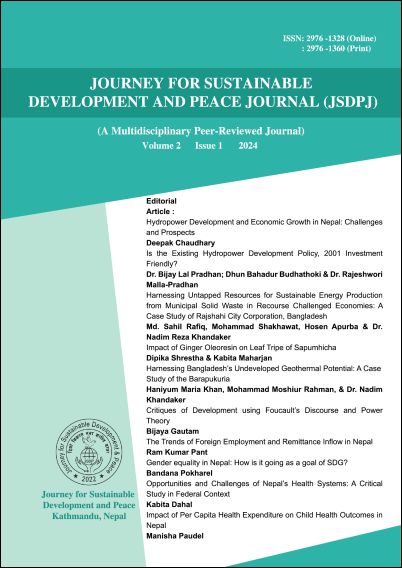Harnessing Bangladesh's Undeveloped Geothermal Potential: A Case Study of the Barapukuria Coal Basin
DOI:
https://doi.org/10.3126/jsdpj.v2i1.63249Keywords:
Renewable energy, Geothermal reservoir, Geothermal energy, Bangladesh energy sectorAbstract
Despite its vast potential, geothermal energy still needs to be tapped in Bangladesh. This study addresses this gap by employing a data-driven, systematic approach to evaluate the Barapukuria Coal Basin as a candidate reservoir for the nation's first geothermal power plant. While existing research mainly focuses on resource identification, this work utilizes geotechnical data from the well-studied Barapukuria region to conduct a comprehensive and thorough analysis. The aim is to quantify the available geothermal power and assess the project's lifetime, energy output, and capacity. The methodology leverages the high geothermal gradient (>48°C/km) observed in the area and existing information on reservoir and fluid properties. This enables the estimation of the recoverable thermal energy and subsequent validation of geothermal system models with empirical data. With no operational or planned geothermal plants in Bangladesh, this study represents a crucial step toward unlocking the resource's potential. The initial results are promising, suggesting the Barapukuria basin is a viable location for transitioning toward cleaner baseload power generation.
Downloads
Downloads
Published
How to Cite
Issue
Section
License
This license enables reusers to distribute, remix, adapt, and build upon the material in any medium or format for noncommercial purposes only, and only so long as attribution is given to the creator.




